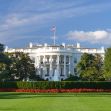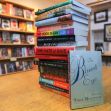March 2nd of every year, which happens not coincidentally to be the birthday of children’s author Dr. Seuss, is Read Across America Day. The connection is clear: at least two generations of American children cut their reading teeth on Green Eggs and Ham, One Fish, Two Fish, Red Fish, Blue Fish, The Cat in the Hat and other favorites. Seuss has therefore figured prominently in the presidential proclamation issued every Read Across America Day.
This year, however, neither Seuss nor his given name Theodore Geisel was anywhere to be mentioned in President Biden’s proclamation. The omission was hard not to notice, especially in light of the fact that, over the past year, Dr. Seuss Enterprises pulled six titles from print: And to Think That I Saw It on Mulberry Street, If I Ran the Zoo, McElligot’s Pool, On Beyond Zebra!, Scrambled Eggs Super! and The Cat’s Quizzer.
The decision was explained in a statement to the AP that ran:
Dr. Seuss Enterprises listened and took feedback from our audiences including teachers, academics and specialists in the field as part of our review process. We then worked with a panel of experts, including educators, to review our catalog of titles…[the withdrawn] books portray people in ways that are hurtful and wrong.
The question everyone is probably asking is what could be so hideously wrong with the six titles that they had to be taken out of print. (They can still be purchased – exorbitantly priced – on Amazon and eBay.) A 2019 study entitled “The Cat is Out of the Bag: Orientalism, Anti-Blackness, and White Supremacy in Dr. Seuss’ Children’s Books” by Katie Ishizuka and Ramón Stephens sheds some light on the issue:
In the fifty Dr. Seuss children’s books, 2,240 human characters are identified. Of the 2,240 characters, there are forty-five characters of color representing 2% of the total number of human characters.
There can be no coincidence that five of the six banned titles are among those that depict characters of color.
The study goes into what’s wrong with Seuss’s portrayal of these characters of color in some depth. This example about Seuss’ first children’s book gives an idea of the order of the criticism:
In the book And to Think That I Saw It on Mulberry Street, exotification and stereotypes are seen when a Chinese man is drawn with chopsticks and a bowl of rice in his hands, bright yellow skin, slanted eyes, a long black braid, and a conical hat. The text beneath him reads, “a Chinaman who eats with sticks.”
Stereotyped caricatures like that can hardly be expected to survive in today’s intellectual climate.
Dr. Seuss Enterprises is a business, and a very lucrative one at that. The attacks on the author for racism (according to definitions of the term that didn’t exist in his day) clearly reached his literary executors’ offices, and not too much cynicism is required to suggest that the six books were pulled out of print so that the rest of the canon could be spared.
That seems very similar to the logic behind the disclaimers Disney stuck onto the beginnings of eighteen episodes of The Muppet Show when they made it to Disney’s streaming service Disney+ this month:
This program includes negative depictions and/or mistreatment of people or cultures…These stereotypes were wrong then and are wrong now. Rather than remove this content, we want to acknowledge its harmful impact, learn from it and spark conversations to create a more inclusive future together.
The obvious strategy was that the disclaimers would stem the tide of criticism and allow the series to be re-released.
A third cherished childhood icon was subjected to similar treatment at the same time that Kermit the Frog was evading cancellation when Hasbro announced that Mr. Potato Head was to be rebranded. Although the toy inside will remain the same, the name on the box will now read simply “Potato Head.”
If all this smacks of appeasement, that’s what it probably is. Dr. Seuss Enterprises, Disney and Hasbro want to continue making money off of venerable children’s assets, and if taking six titles out of print, posting grim disclaimers or changing the name on the box will allow Dr. Seuss, Kermit the Frog and [Mr.] Potato Head to remain cash cows, the sacrificial lambs are worth the sacrifice.
Or is a Faustian bargain being struck? Modifying these cherished parts of American childhood to suit new and aggressively promoted categories, while good business sense for the time being, also opens the door to a kind of censorship that has heretofore been unknown in the United States.
Although the censors aren’t the government (yet), and the acceptance of the censorship has been voluntary (as yet), one has to ask where all this is leading.
The moves show Dr. Seuss Enterprises, Disney and Hasbro succumbing to societal pressures that claim to be for the society’s own good: we are to believe that there is something culturally hygienic in the suppression of If I Ran the Zoo. The books, the disclaimers and the rebranding are – the message is clear – being done out of nobility of social conscience and for the common good.
That poses a very important question in the long run: which will ultimately be better for the common good? Rescuing our children from the dangerous shoals of McElligot’s Pool, or teaching them about the First Amendment?






